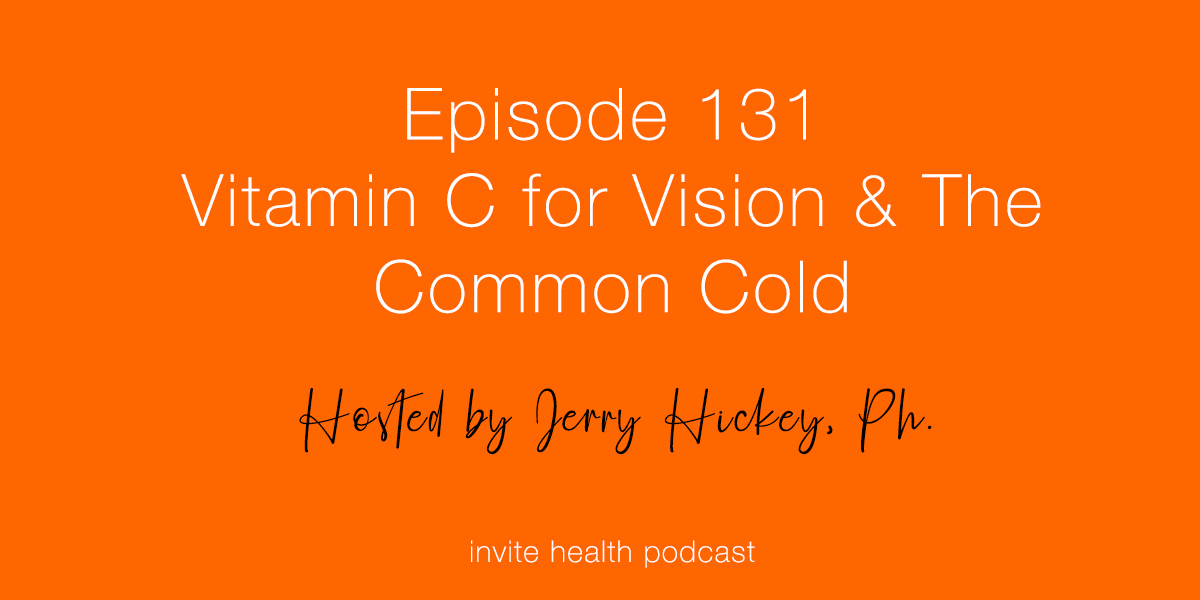Vitamin C for Vision & The Common Cold – Invite Health Podcast, Episode 131

Invite Health Podcast, Episode hosted by Jerry Hickey. Ph
Subscribe Today!
In previous episodes, I have discussed Vitamin C and its benefit in the support of numerous factors, including brain and heart health. On today’s episode, we are going to be discussing Vitamin C and its benefit for vision health and the common cold. Let’s talk science.
Vitamin C And Cataracts
Cataracts are very common. This is a clouding-over of the lens of the eye. The lens of your eye focuses light, which normally produces a very sharp, clear image on your retina. With age, the lens of your eye loses its flexibility and thickens. There is also a large amount of oxidative damage occurring from blue light, sunshine, cigarette smoke and pollution. This damages the lens of your eye and contributes to cataracts.
Your eyes super-concentrate Vitamin C. In fact, in the fluids of the eye, the concentration of Vitamin C is 15-20 times higher than in your blood plasma. So, a drop in the level of Vitamin C in the eye, may cause an increase in the severity of cataract production and a higher risk of developing cataracts. Here are some more stats:
- Cataract risk starts to increase at the age of 40
- About 50% of Americans have cataracts by the time they turn 75 years old
- About 70% of Americans have cataracts by the time they turn 80 years old (seven out of 10 people develop cataracts by the time they are 80 years old)
A meta-analysis of existing, high-quality studies was performed to discuss the link between Vitamin C and cataracts. Researchers actually looked at the blood plasma levels and found that higher plasma levels of Vitamin C are strongly connected with a reduced risk of developing cataracts. This is important, but these are studies that are actually looking at blood levels – the plasma concentration of specific nutrients – and not just a questionnaire about nutrition or dietary intake.
Age-Related Macular Degeneration
This is the leading cause of blindness in aging people. In the back of the eye is the coroid body that contain blood vessels, which feeds and nourishes your retina. There is a protective substance in front of the retina called your macular tissue. It kind of works like a catchers mitt, keeping harmful things away from your retina. With age, nutrients that build up your macular tissue are not absorbed well. The macular tissue starts to thin and is not as robust. Now, factors like blue light are easily penetrating into the back of the eye.
When you have enough nutrients in your blood serum like Vitamin C, Zinc and Lutein, they can help build a robust, thick filter (macular tissue) that helps to filter out these harmful substances, like blue light.
But, where do you get exposed to blue light? There are a few common places that you may even be looking at right now – your computer screen, cell phone, high-definition TVs, and video games. A population-based cohort study from the Netherlands looked at people 55 years old and older and found that the participants that had a lot of Vitamin C in their diet (but also zinc, beta-carotene and vitamin E) it lead to a reduced risk of developing age-related macular degeneration.
Vitamin C and The Common Cold
In a previous episode, we discussed Vitamin C for the immune system and how important immune cells that get to the site of an infection require Vitamin C for activation. These immune cells also require Vitamin C to kill the infection. If you are lacking Vitamin C, not enough of these cells are functioning at an adequate enough level to protect you from a virus.
Researchers have found, in very active people, Vitamin C (when taken prophylactically, or before you get a cold) that it can help reduce the symptoms and the duration. This includes runners, body builders, soldiers, skiers, and dancers or for those who live in harsher and colder environments. Vitamin C, when taken prophylactically at about 250mg to 1000mg per day was also found to reduce the incidence of getting a cold by 50%. The same was found in the general population. Studies have shown that daily supplementation of Vitamin C, means fewer colds, shorter duration, and milder symptoms for the general population.
Questions about Vitamin C? Do you currently take a Vitamin C supplement and have seen a benefit or difference in your incidences of getting sick? Leave us a comment below to join the discussion!
Thank you for tuning in to the Invite Health Podcast. You can find all of our episodes for free wherever you listen to podcasts or by visiting www.invitehealth.com/podcast. Make sure you subscribe and leave us a review! Follow us on Facebook, Twitter and Instagram at Invite Health today. We’ll see you next time on another episode of the Invite Health Podcast.


